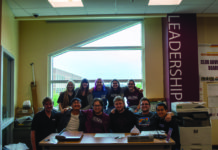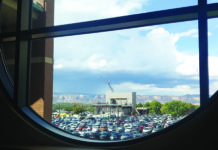Before the world was engulfed in the hysteria surrounding the coronavirus pandemic, it wasn’t uncommon for the topic of Syria to be in international headlines.
The ongoing conflict of the Syrian civil war once garnered a lot of media attention. While the atrocities facing the people of Syria can still be found by sifting through a few articles, the world has become distracted, which in turn allows many of the human rights violations that occur in the country to go unaccounted for.
Following the Arab Spring, the war in Syria began in 2011. Since then, the country’s violence has caused the displacement of millions of people. This statistic continues to increase.
Fought primarily between the government (which is led by President Bashar al-Assad) and other factions, such as the Islamic State (ISIS), the Syrian civil war has killed at least 226,247 civilians, according to the Syrian Network for Human Rights (SNHR). Since the fighting began, it is estimated that there have been over 25,000 children casualties.
The war has also stimulated one of the worst humanitarian crises in decades. As of 2018, over 6.7 million Syrians were residing in countries other than Syria as a result of the war. Refugees continue to seek asylum in places like Turkey, Jordan, Lebanon and the European Union.
With such a high caliber of violence, it’s really a no brainer as to why people are fleeing the country. The once great cities of Damascus, Aleppo and Raqqa have been reduced to rubble from the incessant bombing. Militant groups, such as ISIS, continue to fight against rebel forces, spreading barbarism throughout once safe neighborhoods.
So, with the hope of a better life, parents, brothers, sisters, husbands, wives and others take their loved ones and flee, oftentimes subjecting themselves to the harsh conditions of refugee camps if it means an escape from the horrors of war.
Now, however, the people of Syria have a whole new facet of life to worry about: the coronavirus pandemic, or COVID-19.
Dani Qappani, originally from Syria, works for the Syrian Network for Human Rights (SNHR) in the Reports Department. The group is an independent, non-governmental and non-profit organization that advocates for human rights in Syria by documenting violence and human rights violations in the war. According to their website, they do so as a means of holding perpetrators accountable. They operate off the principle of “no justice without accountability”.
Qappani worked as a volunteer with the group for some time before he was displaced himself at the hands of the civil war’s violence. He then became an official member of the SNHR after undergoing training.
“Since the foundation (of the SNHR) in 2011, the primary objective […] has been and remains to document human rights violations in Syria, to protect and promote human rights and to work to ensure that the perpetrators of all crimes are held accountable. Through this work, we aim to honour and attain justice for the victims, to deter further crimes and to help ensure accountability and assist in laying the foundations for the establishment of a modern, democratic governing system based on multiparty democracy, freedom, human rights and justice for all,” Qappani said.
The problems that face the people of Syria go far beyond just airstrikes, mortars and bullets. Malnourishment, marauding and kidnapping are among the many other side effects that this war has given rise to.
“…no Syrian, including all those on SNHR’s team, is unaffected by the war. Millions of the dispossessed are still living in squalid, massively overcrowded refugee camps both in Syria and in neighbouring nations. The traumatizing effect of this on the physical, mental and emotional health of the people, more particularly the children, is beyond calculation,” Qappani said.
As a result of such poor living conditions, refugee camps are the ideal location for an outbreak to spread. Since the war began, the physical health–along with the mental health–of refugees has been deteriorating. Infectious diseases, that are otherwise preventable if treated properly, have spread at uncontrollable and rapid rates in refugee camps across Jordan, Greece, Turkey and Syria.
“The already dire conditions are deteriorating, with woefully inadequate aid available to meet the needs of millions dispossessed and living without the bare minimum of essentials. Even in regime-controlled areas where some have returned from exile, the regime’s ‘resettlement’ deals are resulting in those returning being arbitrarily detained and ‘disappeared’ or conscripted into the regime’s forces,” Qappani said.
One of the many losses at the hands of the war has been the country’s infrastructure. Constant fighting has severed almost all stability, including a durable healthcare system. As a result, the country lacks the proper resources to effectively respond to an outbreak of the virus.
The anarchy that has ensued in places with heavy fighting only worsens the ability for Syrians to oblige by social distancing guidelines and seek proper medical treatment.
“Lawlessness is widespread in these regime-controlled areas, with various militias fighting turf wars among themselves for control of neighbourhoods. Kidnapping for ransom is an everyday event, while looting and burgling the homes of those forced to flee and selling the remaining contents is considered a ‘perk’ for the regime’s militias in lieu of payment.”
This climate of lawlessness in the country leads to resentment, hostility and fear amongst the remaining population who are already traumatized from over nine years of tyranny and terror at the hands of the regime, its accomplices and terror groups such as ISIS. So long as the status quo remains, with the governing regime continuing to destabilise the nation, leaving refugees terrified of returning to their homes for fear of being arrested, tortured, ‘disappeared’ or forcibly conscripted, the conditions will not improve.
The Assad regime is particularly enigmatic in communicating the country’s status in regards to the virus. As a result, it is especially difficult to gauge how widespread the coronavirus is within Syria.
“The (Assad) regime’s secretiveness means that it’s impossible to know the real figures of those infected (with COVID-19) in regime areas, but according to reports from a number of local media, infections are widespread and there have already been a large number of deaths, with the regime’s health ministry reportedly ordering medical personnel to report COVID-19 cases as other diseases or medical conditions in order to minimize the official numbers,” Qappani said.
SNHR issued a report at the beginning of April showing that the regime is continuing to encourage conditions that could help spread the disease, with crowds gathering outside banks to withdraw money and assembling outside bakeries to buy bread for their families.
In addition to this, Iranian regime troops and militias are widely reported to be vectors for the disease, with the regime’s dependence on these forces meaning it can’t afford to reject their presence, meaning a further danger of greatly increased rates of infection.
“After the regime destroyed at least hundreds of hospitals and imprisoned or dispossessed thousands of medical personnel since 2011, as SNHR has detailed at great length, the country’s already struggling healthcare system simply can’t handle a pandemic of this severity. That’s before we even mention the four million people in Idlib where the horrendous conditions in massively overcrowded refugee camps with no adequate healthcare or sanitation mean there is no possibility of observing recommended social distancing or hygiene measures. These conditions mean the scale of any outbreak in north Syria would be catastrophic.”
Various online sources have nodded at the possibility that the Assad regime is purposely trying to spread the disease amongst refugees as to eliminate the burden that they pose to the government.
If the virus does become more widespread in the ruined cities and refugee camps, then it could very well become an unmanageable situation, given the major lack of resources these people have access to.
“The overcrowding and lack of sanitation in refugee camps where even running water is a rarity make it impossible to observe the recommended social distancing and hygiene measures […] there’s also a near-complete lack of facemasks and other personal protective equipment,” Qappani said.
“Refugees are already immunocompromised due to overcrowding, poor conditions, lack of nutrition and constant stress, with coronavirus only the latest disease threatening to overwhelm the already overstretched remaining medical facilities and personnel. In short, refugees are the most vulnerable to this pandemic in every way.”
Healthcare workers are a rare commodity, as there has been speculation that the Assad regime has targeted medical professionals, according to the SNHR.
While many people across the globe are complaining about the inconvenience that quarantine burdens them with, it’s important to keep in mind that people in Syria, as well as Yemen, Iraq, Afghanistan and others, are in a uniquely vulnerable situation to the virus.
“One way people can help is to raise awareness of what’s going on, contact media and lobby politicians and leaders to help ensure that Syrians can finally be free of tyranny, terror and war and have the justice, peace, human rights and freedom that they’ve been denied for so long,” Qappani said.
Another way to help is donating to legitimate non-profit groups that seek to help give medical treatment to Syrian refugees.






